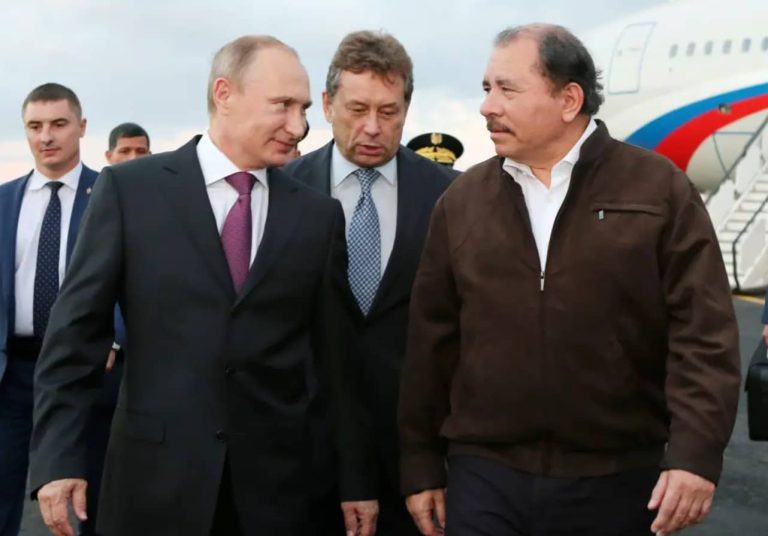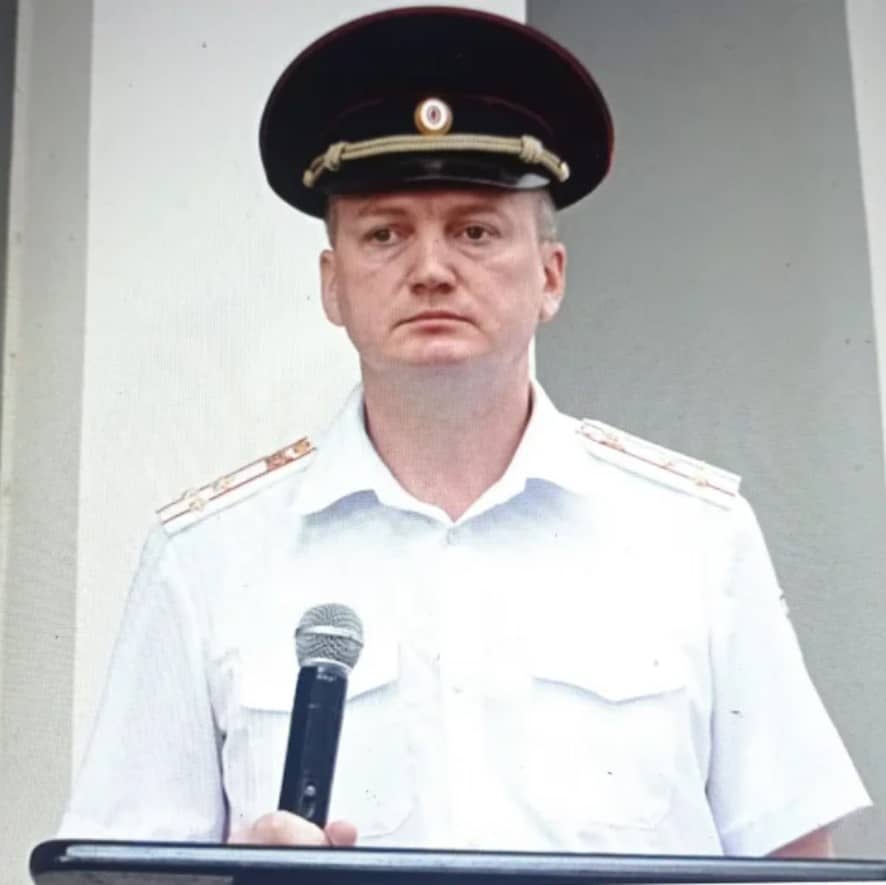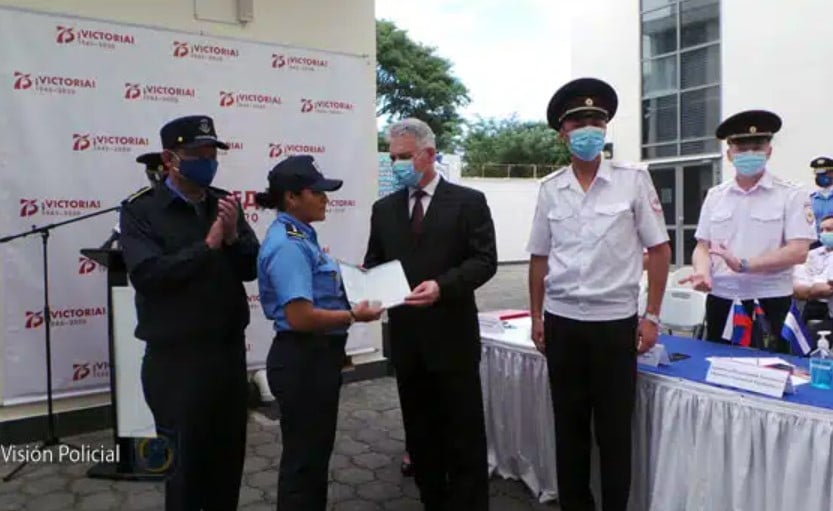7 de febrero 2023

Ortega Grants Chinese Company a Huge Mining Concession

PUBLICIDAD 1M
PUBLICIDAD 4D
PUBLICIDAD 5D
Report from the US Institute for National Strategic Studies reveals that Russia trained police in “digital surveillance” in 2018

When government repression bloodied Nicaragua in 2018, with 355 killings and over 2,000 wounded, the country became the site of one of the gravest human rights crises in Latin America. At that time, the regime of Daniel Ortega was receiving training from the Russian Federation, aimed at strengthening their repressive capacities. The Russians have gone on to play “an active role in the national cybernetic intelligence.”
The man charged with making this all possible is Russian Colonel Oleg Surov, who directs the police training center set up in Managua to develop Central American police officers. This information and more is contained in a report from December 2022, entitled: “Dangerous alliances: Russia’s strategic inroads in Latin America.” The report was authored by Douglas Farah and Marianne Richardson, under the auspices of the US National Defense University’s Institute for National Strategic Studies.
“Our sources with direct knowledge of events said that when protests against the Ortega regime broke out in 2018, Surov was tasked with providing special training to a select group of Nicaraguan police, in classes titled ‘Modern Means and Methods to Combat Extremism and Terrorism,’” the authors affirm.
Farah and Richardson are employed as US National Security Consultants for IBI Consultants, a private research and advisory firm. During the 90s, Farah covered Latin America as a journalist with the Washington Post. As a consultant, he has investigated the money trail within Colombia’s FARC (Fuerzas Armadas Revolucionarias de Colombia), and some of the Venezuelan business dealings. These journalistic investigations have been featured in both the US and Latin American press.
The sources used to write the report stated that Surov operates outside the normal Russian embassy chain of command, reporting directly to Moscow instead of to the Russian ambassador, or chief military official in Managua.
In addition to offering the Nicaraguan regime specialized training in these areas, the objective is to “create a cadre of intelligence officers familiar with and loyal to Russia, who could operate not only in Nicaragua but across the [Central American] region.”

Colonel Oleg Surov, director of the Russian Police Training Center in Managua. Photo: Nicaraguan Police website
Colonel Surov’s assigned role
Surov is also charged with selecting the “growing number of Nicaraguan officers” sent to be trained in Russia. In 2022, the authors assert, some 150 police officers have been trained in that country.
The Nicaraguan regime’s closeness with Putin is so notable that on December 20, 2022, Ortega praised Zhukov Serrano Perez, the Nicaraguan National Police’s newly appointed Assistant Head of Investigations, by stating that his chief merit was having graduated in the Russian Federation. Zhukov Serrano has worked in the shadows of Nicaragua’s intelligence field since before the 2018 crisis.
The Nicaraguan dictator also lavished praise on his repressive inner circle, a small group of officials, whose principal figures have been sanctioned by the international community for human rights violations. First among these is Commissioner Ramon Avellan, Assistant Police Chief, considered the chief operator of the regime’s “Operation Clean-up,” as they called the violent dismantling of the barricades that authorities carried out using deadly firepower in 2018.
While Ortega displayed his pride in the repression and his satisfaction with his relationship with Russia, internally, the regime has strengthened their counterintelligence apparatus through a series of changes and appointments. The changes are aimed at detecting possible deserters who might try to divulge outside the country the details of how the system functions. A similar repression was sharpened against the state workers, some of which are currently in jail, charged by the prosecution with cybercrimes.
Everything circulating on the internet is an object of interest to Nicaragua’s ruling family. In March, 2018, first lady and vice president Rosario Murillo spoke in favor of regulating the social networks, since she considered that Nicaraguans were being “negatively influenced.”
“Digital and technological surveillance”
Under cover of absolute secrecy, the regime began offering the police training the report speaks of. Nearly five years ago, Russia began providing “digital and electronic surveillance techniques” to the police officers mentioned. According to the report, these enhanced the Nicaraguan regime’s capacity to “repress and control civil society.”
As part of the follow up to that initial training, three years later, 20 officers also attended another session taught by the Russian Ministry of Internal Affairs, entitled: “The fight against computer information crime,” focused on electronic surveillance techniques.
“Since then, Ortega’s primary enforcer and national security adviser, Nestor Moncada Lau, who was sanctioned by the US Government for violently suppressing the protests in 2018, established a new permanent structure within the Nicaraguan National Police to carry out intelligence and surveillance activities with Russian advisers,” the investigation reveals.
The surveillance center is located on the second floor of the Telecommunications and Postal Services (Telcor) Building, the government’s regulator of this sector. Beyond the site itself, the report underlined the strategic importance of the Russian training and technology in the context of the repression that strangled the 2018 citizen uprising.
“The Russian training and technology were instrumental in allowing the Ortega regime to identify, imprison, or execute the student leaders through cell phone tracking on WhatsApp and other encrypted applications in the largely decentralized protest movement in 2018,” the report concludes.

2020 closing ceremony of a Russian-led course in Cybercrime given to the Nicaraguan police. The photo shows Colonel Oleg Surov and Police Commissioner Ramon Avellan. Photo from Nicaraguan National Police.
Bloc of Russian allies in Latin America
Nicaragua belongs to a group of countries that also includes Venezuela and Cuba, identified as Russia’s “principal allies” in Latin America. They’re characterized by maintaining a populist discourse, but also of persecuting their opponents, eliminating judicial independence, and restricting press freedom.
According to the report, the Russian Federation seeks to strengthen ties with those countries that are geographically close to the United States, in order to expand their geopolitical influence. That hasn’t gone unnoticed in the United States, even though the Cold War ended 31 years ago.
At the beginning of February of last year, Russia’s then ambassador to Managua said that only a reduced group of his countrymen would remain in the country, without specifying a number. According to a report published by the “Sputnik” news agency, he assured that the Russian cooperation “isn’t aimed against third countries.”
However, the report authored by Farah and Richardson cites a declaration from the US Southern Command that exemplifies how the United States views Moscow. To US authorities, “Russia continues to destabilize [the Western Hemisphere].” According to this view, their relationship with political allies such as Nicaragua allows the Federation “to expand its air and sea access to project power throughout the region.”
Ortega and the military apparatus treat the details of their local ties with Russia as state secrets. “Russia’s main activities in Nicaragua—its permanent military presence, cyber activities, and increasing training programs for both the army and the police—take place mostly in the shadows,” the report stresses.
Nonetheless, the report also notes that Nicaragua allows the permanent presence of 250 Russian military personnel on the ground. They also maintain a satellite station for Russia’s GLOSSNASS navigation system, baptized La Gaviota and located in the area around Nejapa. In the past, this has been accused of being a center for espionage, although since 2017, Nicaraguan authorities have denied that such intentions exist.
The strengthening of local cybernetic, intelligence and cryptographic capacities are also important. “These interventions touch multiple strategic interest points for Russia, and, as discussed below, through the GLONASS project and other activities, may be part of the implementation of the establishment of Russia’s own ‘sovereign Internet’ project, signed into law by Putin in November 2019.”
In terms of “information technology security,” as Confidencial investigated in a report published at the end of February 2022, Ortega has bowed to Russia’s interests, in contrast to his “antiimperialist” discourse.
He attacks the United States, the European Union and Canada for demanding the release of his political prisoners, justice for the victims of the repression, and an immediate return to democracy for Nicaragua.
However, on the other hand, the dictator has opted to move closer to China and Iran, a club of nations that spout rhetoric similar to Ortega’s antiimperialist discourse, and also maintain similar practices that go against human rights. In a detail no less important, these countries have made no official contributions to Nicaragua’s budget between 2018 and 2023, according to an investigation published by Confidencial.
Nicaragua’s official budget doesn’t include Russia’s military cooperation with Nicaragua, nor the recent donations of wheat and buses.
In 2021, Russia and Nicaragua signed an agreement in which a series of threats to “international information security” are defined as “acts against national sovereignty, security and the territorial integrity of the States.”
The accord also notes as threats: “illicit access to computer information, and interference in internal affairs.” Another topic that completes the repressive script is “disseminating information that damages the sociopolitical and socioeconomic system, as well as the spiritual, moral and cultural environment of other governments.”
In 2020, the Ortega regime approved a special cybercrimes law designed to punish “fake news.” This gave a legal framework to the persecution carried out against those who had aspired to run against Ortega in the 2021 presidential elections, as well as members of civil society, business leaders and opposition leaders.
While the country sank into repression, Ortega had himself reelected in a voting process that lacked all democratic guarantees. The election was called into question by an ample margin in the Organization of American States, opposed only by a group of countries that supported the dictatorship, a position for which Russia stands in the first row.
Farah and Richardson’s analysis recalls that the “Mechnikov” Latin American Biotechnical Institute is also located in Nicaragua. This center was built with millions in investment money from Russia and from the Nicaraguan Social Security Institute. Although it was inaugurated in 2017, it has not produced any of the vaccines that its chief representatives promised at the time.
Since March 2020, this laboratory has been working on the production of the anti-Covid drug Interferon alfa-2B, they note. From an economic point of view, though, [Russia’s] ties to this appear to be modest ones.
“From January 2020 to September 2021, Nicaragua registered USD 17.2 million in exports to Russia and USD 126 million in imports from Russia. Many bulk imports and exports have no identifying description (they are labeled as “N/A” or “other”), but they still provide an important perspective regarding the countries’ economic relationship and the opaqueness of that relationship,” the report states.
Although Putin has shown affection for Ortega, congratulating him in the past for his “electoral triumphs,” the Nicaraguan dictator is often more expressive. On October 6, 2022, when the president of the Russian Federation turned 70, he received the following message from Managua: “We are with you, contributing with our support from the valuable and historic relationship that unites us, and fighting with energy and optimism for that better multi-polar world.” The message came from Daniel Ortega.
This article was originally published in Spanish in Confidencial and translated by Havana Times
PUBLICIDAD 3M
Confidencial es un diario digital nicaragüense, de formato multimedia, fundado por Carlos F. Chamorro en junio de 1996. Inició como un semanario impreso y hoy es un medio de referencia regional con información, análisis, entrevistas, perfiles, reportajes e investigaciones sobre Nicaragua, informando desde el exilio por la persecución política de la dictadura de Daniel Ortega y Rosario Murillo.
PUBLICIDAD 3D